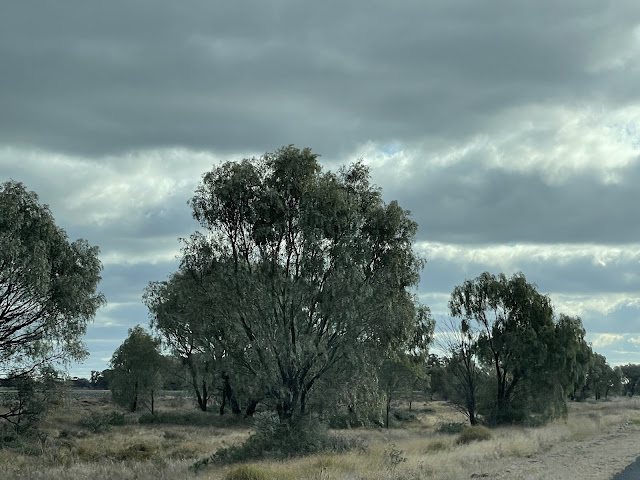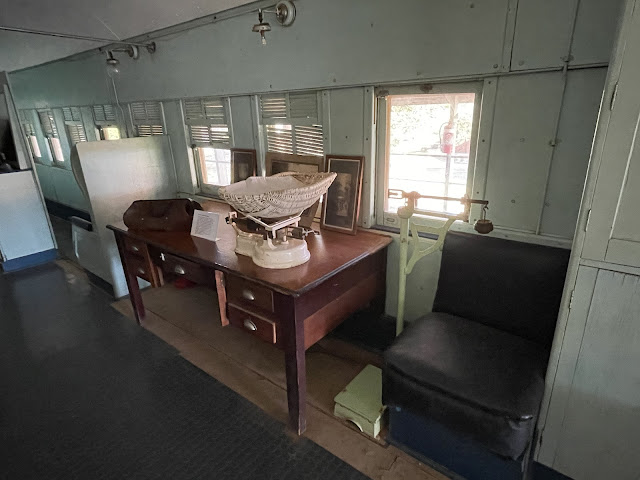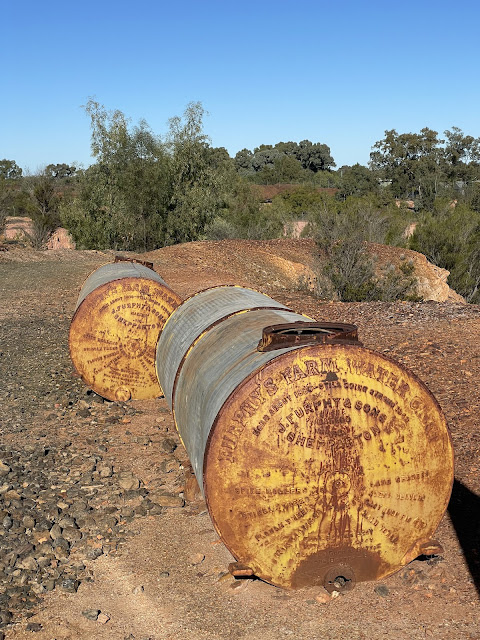Mick has decided on the theme of our big adventure… “We are off to see the Wizard”. I suppose that works, as we will be seeing quite a bit of Oz. Therefore all these posts will have the label “2022 Off to See the Wizard”.
BATHURST TO HERMIDALE
We got away as planned on Friday, covering ground we were on only a few months ago, so not many stops this time.
It was rather wintery, being foggy, a little rainy and cold. The forecast was for a maximum of 9 degrees C. Hopefully, that will be the last of such weather we will see for this year.
We stopped briefly at Molong for morning tea.
Then Narromine for lunch.
The first day is always a day of firsts.
Whenever we head west I look for the first myall trees. They have a lovely weeping habit.
Then the first wilga trees. (The one on the right that looks a bit like a willow.)
And the first bimble box trees. (The tallest tree.) They are one of my favourites. Whereas most gum trees have elongated, dull greyish green leaves, they have round, shiny, bright green leaves. When there is a slight breeze and the sun shines on them, the leaves sparkle. Mick reckons they are like nature’s fairly lights. Also, I love the way the name rolls off the tongue. Bimble Box.
We called in to Nyngan to buy a few bananas to eat along the way and went for a little walk up the street to stretch the legs. There was a shop front which appeared to have some paintings inside. We peered through the window and saw it was actually an artist’s studio and the artist was working away. She noticed us and invited us in.
Her name is Jamila Hume and is a delight. We loved her work in oils. She only started painting four years ago and is exhibiting in several galleries. There will be an exhibition of her works at the Peisley Street Gallery in Orange from August to December, so we will definitely make the trip up to see it once we return home.
As we drove along we started to listen to the audio book “The Guilty Man” by Helen H. Durrant. We had listened to another of hers on our last trip and enjoyed it.
We weren’t sure where we would end up for the day and found the tiny village of Hermidale, between Nyngan and Cobar to be a good destination. There are a couple of powered sites beside the little pub.
We were set up in time for afternoon tea. A couple of days before we left we did some baking, Anzac biscuits, cherry biscuits and a ginger slice. All things that would travel well and keep well.
The first of our outback sunsets.
As it was Friday night and Mick likes to watch his footy, we went to the pub for dinner. They certainly can put on a good feed. It was quite busy with a couple of large groups arriving. While we were eating, a lady came up to us and asked “You’re Mick Hope, aren’t you?”. It turns out she is a good friend of one of Mick’s cousins. He hadn’t seen her in about forty years. You can’t, hide can you.
As the pub was getting rather noisy with so many people I went back to the van and started working on the hexies for the blue quilt.
I found the kitchen counter to be an ideal place to work, being a good height for cutting and the overhead LED light was perfect. There are now four hexy flowers cut and glue basted, ready to stitch, when I am in the mood and have good light.
After that I started to read the book “The Nowhere Child” by Christian White.
Obviously, there was no internet coverage.
We think we will look for a highlight of each day.
The Highlight of the Day was meeting Jamila and seeing her art, as it was such a delightful surprise.
HERMIDALE TO SPRING HILLS REST AREA
Our second day was also a day of firsts. We saw lots of birds we don’t see at home - apostle birds, choughs, butcher birds, black kites and the most exciting - two major Mitchell cockatoos. I’ve never seen them in the wild before. They are the pink and white ones. We get the sulphur crested cockatoos (the yellow and white ones) at home and now also have started to get little corellas (similar, but no crest).
We also saw our first wild goats. They have so much more road sense than other wildlife.
Our first port of call was at Cobar.
We have often passed through, but have never visited the museum before. That was rather fortunate, as it turns out, as they have just completed a major restoration and refurbishment.
The building was the offices of the Great Cobar Mine, which was a huge copper and gold mine.
It must have been some sight to see. It operated from 1874 until 1919, leaving 700 workers without a job. In 1924 the property was sold and the equipment dismantled and sold for scrap.
They still mine copper at Cobar today, although there has definitely been a history of boom and bust for the town.
The displays were really interesting.
Firstly there was the indigenous history. Although not indigenous, we were intrigued by a xylophone made from stones over a hollow log.
There were a few examples of winder chairs.
An interesting story.
Another version.With more interesting information.
Upstairs they have some more domestic style displays.
I was intrigued by the unusual little upright spinning wheel. There was no information about it.
The little patchwork quilt on the bed was gorgeous. It appeared to be a cot size.
The outside border was a green finely striped fabric. The outer ring of hexies were alternating white with a tiny black spot and a lemon print. It just created that little bit of space from the coloured fabrics. The maker obviously had a good eye for colour and design, as everything was so well balanced.
The outside area still has to be done up, but what fascinated both of us was an old train carriage. It was from the Royal Far West Children’s Health Scheme. When we were at school, we always raised money for their home at Manly, so I have always been aware of it. It turns out that the organisation was founded at Cobar by Reverend Drummond, who was appalled at the lack of facilities for the children of the bush. One thing he started was a holiday by the sea for children from the outback. What a treat that must have been.
The carriage dates from the 1930s and was so well set up, complete with kitchen and bathroom. I couldn’t believe how intact it was after all these years. It took them about five weeks to complete their rounds.
The original open cut mine is just out the back.
There were two furphy water carts, albeit in poor condition.
Over the road from the Museum is a Cobar Heritage Park, including a memorial to the miners who have lost their lives while mining at Cobar. This Headframe is from a mine that operated from 1943 until 1952.
The statue of a miner is a memorial to the over 150 men who have lost their lives while mining in Cobar from 1870 to 2000. The most recent fatality was in 2017, showing that mining, and underground mining in particular, is still a dangerous occupation.
After Cobar, we were now in the wide open country, with rich red soil.
Back on the road, our next stop was Wilcannia for fuel, crossing the Darling River.
Past Wilcannia, I had to take a photo of this windmill, as I had done the previous two trips out this way.
We had decided that we would free camp for the night at a rest area west of Wilcannia.
It was a lovely spot, with quite a bit of bird life. A butcher bird even posed for its photo.
As the weather was rather chilly and breezy, we lit a little fire.
We didn’t think we would get much of a sunset.
As evening drew in the clouds cleared and the wind dropped, that all changed, providing us with a beautiful outback sunset.
When you get coals as lovely as that you just have to make some toast.
After we had our dinner, I finished reading “The Nowhere Child”. It was rather good. That’s what happens when there is no internet coverage.
The Highlight of the Day was sitting around our little camp fire and cooking toast.














































Thanks Janice, interesting to read all the history. Safe travels
ReplyDeleteWow Janis so much ground covered already ... enjoy
ReplyDeletefantastic travelogue post! i am enthralled already and getting to see so much of the country!!!
ReplyDeleteI love reading and travelling along with you.
ReplyDeleteA great start. Looking forward to more armchair travels with you both.
ReplyDeleteA good couple of days.......
ReplyDeleteYou are off and away on your travels, already seeing lots of interesting things. Like you, I love looking at old textiles in museums, imaging how the lady of the house stitched away I the evenings after milking the cow, churning the butter, attending to a large hungry brood. Lighting camp fires is not such a thing here, although it seems very popular in Oz and USA.
ReplyDeleteAnd I like now you are mentioning the highlight of the day, I may have to borrow that idea.
Off to a great start Janice, wonderful post.
ReplyDelete